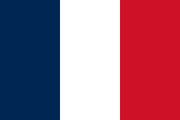Work In Progress The aftermath of the Great War had reshaped the world in terms of new powers and rivalries. The new world powers were now the German Empire and Russian Empire, and to a lesser extent the United States but it was more focused internally on rebuilding than flexing muscle. Great Britain was still a world power but was severely weakened by the war.
Countries[]
British Empire[]
Behind the United States and Ottoman Empire Britain was one the top nations exhausted by the war. The war was a severe curtail to British Imperialism for many years to come. Britain was behind only the Ottoman Empire in terms of loss territory (Ireland and portions of Canada). Britain had spent a large majority of its economic resources on the war however when Abraham Lincoln nationalized all British investments and companies based in America, the economy took a major toll for the worse. After the war it would be many years before Britain would get back on its feet economically.

The war had taken a large toll on the British Army. To keep order in Britain's far off colonies Britain had use local troops as garrisons until the regular British Army could restore order. However, much of what remained of Britain's army was stationed in India, where memories of the Great Mutiny and because of the rumors of another Indian rebellion. These would be the first of things that would lead to Britain's colonies to begin demanding more and more independence from Great Britain. Only Canada, which feared American expansion, would remain completely loyal to Britain.
France[]
In terms of humiliation France was the country that easily took the lead in this category. Its army was beaten on nearly all fronts, its capital bombarded and occupied by Germany, and was now overtaken by the new German Empire as the continental power of Europe

Despite some initial successes against Prussian incursions into France, Prussia and its allies steamrolled through France and humiliated the French Army in battle after battle. The capture of Napoleon III threw the government into anarchy and led to the creation of the Third French Republic. To make matters worse Italy and Spain both joined in on the war against France and began attacking French colonies in North Africa and on mainland France itself. During the Siege of Paris the city had sustained some moderate damage. After the city finally fell, France capitulated.
After the war one of the main driving forces of French politics was the spirit of Revanchism (Revenge) against Germany, Russia, and America. This would drive France closer to its old enemy, Britain, because both knew that only together could they counter the Grand Triumvirate.
German Empire[]
Germany, alongside Russia, emerged as the two new world superpowers because of the war. For the first time in its entire history, the numerous Germanic kingdoms and states were now under a single united German government. Prussian armies and generalship had proven their superiority to the French and Austrian ways of fighting and now their armies would serve as the model for many world armies (particularly Russia and the United States).

Despite being the last nation of the Grand Triumvirate to join, Germany had proven it was the senior partner in trio. Unlike its other partners Germany was the country that came out most unharmed and more powerful. America's infrastructure had taken a huge toll and Russia's Generalship had proven to be quite ineffective. Nevertheless Germany worked carefully to preserve the alliance to keep the balance of power in Europe intact. France, especially desired revenge against the German Empire, but knew it couldn't afford a war with Germany without Russian and American intervention.
The post-war period in Europe by historians has been called "Pax Germanica" due to Germany being the dominant militarily, economically, politically, and culturally country in much of Europe.
United States[]

The war had taken the hardest toll on America, nearly the entire southern half of the country was devastated from war as were substantial chunks from of the Northeast. Like its allies America was now a world superpower on the same terms with Britain, Germany, and Russia. However, the Lincoln administration was now more focused on rebuilding the country. The southern states were subsequently turned into military districts but by the end of Lincoln's third term all the states would be returned to the Union, much to the chagrin of the Radical Republicans.
During Reconstruction, the south would become largely industrialized and a compensation program for southern plantation owners was begun. For the newly freed slaves many programs were set up to get the new citizens on their feet to build a new life. However, despite being free this didn't stop whites from trying to keep the blacks down. In several states segregation laws were put in place, the Federal government under Lincoln would continually combat these laws. However, as Lincoln left the presidency, new Republican presidents would let the laws be left intact.
On the international stage the U.S. would use the Grand Triumvirate as a way to backup the Monroe Doctrine as the U.S. began to expand its own influence on the world, primarily the remaining British and French colonial holdings in North America.
